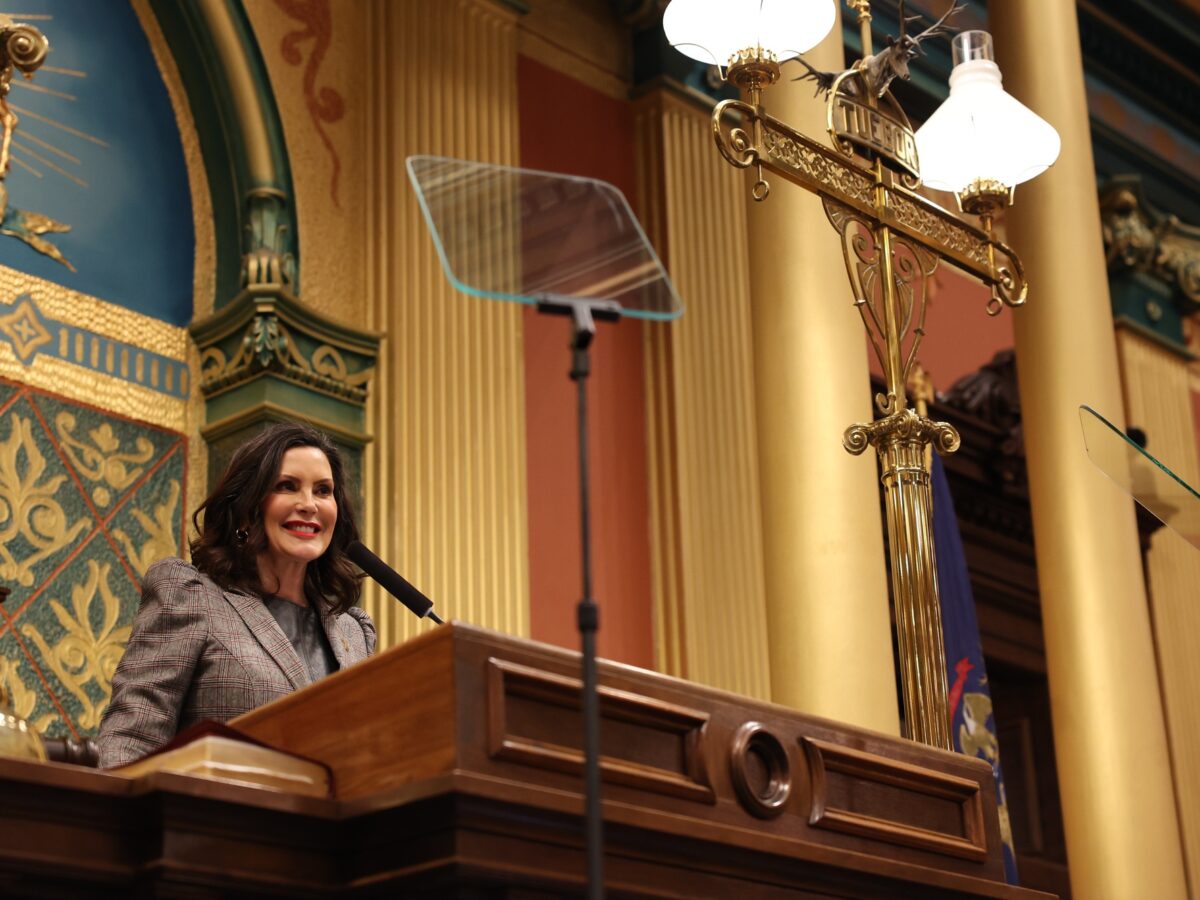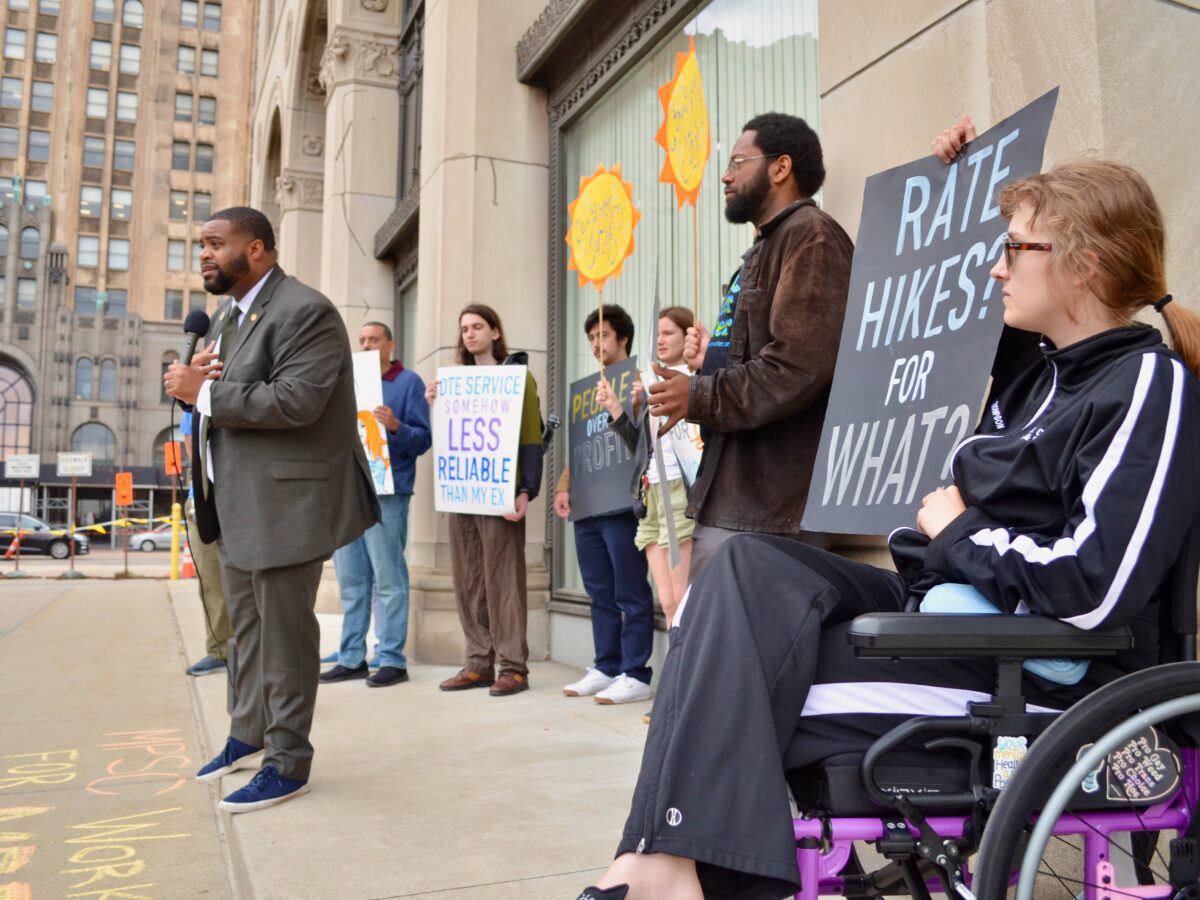Overview:
-Gov. Gretchen Whitmer appoints Shaquila Myers to Michigan Public Service Commission, names outgoing commissioner Alessandra Carreon as chief climate officer.
-"It was super disappointing when they let go of Carreon," says Michelle Martinez, director of the Tishman Center for Social Justice and the Environment at the University of Michigan.
-The MPSC will soon decide on over $1 billion in proposed rate increases for DTE Energy and Consumers Energy.
Gov. Gretchen Whitmer appointed longtime political staffer Shaquila Myers to the Michigan Public Service Commission Monday, a decision that sparked concern among environmental justice advocates about the influence of utilities on the selection.
Whitmer declined to reappoint Commissioner Alessandra Carreon, who is widely seen as sympathetic to renewable energy and environmental justice, after she served two years of a partial term.
Carreon instead was appointed by Whitmer as the Michigan Department of Great Lakes, and Energy’s chief climate officer, leading EGLE’s Office of Climate and Energy to address climate change and enact the state’s climate plan. Carreon begins the new role in August.
Myers, who grew up in Detroit, has worked with several lawmakers, including as senior advisor to Whitmer and chief of staff for former Michigan House Speaker Joe Tate (D-Detroit). She will be one of three commissioners on the MPSC, serving a six-year term.
Next 5 years critical for Michigan regulators: Environmental advocate
An account linked to Tate received $100,000 from a nonprofit led by DTE Energy executives in 2023, The Detroit News reported in December 2024. The donations came during a period of widespread calls to reform Michigan utilities, following a 2023 ice storm that left hundreds of thousands of Michiganders without power, often for days.
Carreon’s replacement with Myers raises concerns among environmental justice advocates that utilities are influencing regulators during what they say is a crucial moment for Michigan’s clean energy transition.
DTE and Consumers Energy are scheduled to file Integrated Resource Plans, or long-term plans for how the utilities will deliver power, with the commission in 2026 and 2027, respectively. The MPSC will also soon decide on over $1 billion in proposed rate increases for the two companies.
“It was super disappointing when they let go of Carreon,” said Michelle Martinez, director of the University of Michigan’s Tishman Center for Social Justice and the Environment. The next five years will be critical for determining how the state regulates data centers, small nuclear reactors, and coal plants, she said.
These decisions could influence “the climate forecast for the next 40 years,” Martinez told Planet Detroit.
Whitmer called attention to Myers’ work on economic development and climate legislation in a press release.
“As chief of staff to the Speaker of the Michigan House during a historically productive legislative session, she helped shepherd the passage of bold clean energy legislation that established our 100% clean energy standard, created jobs, improved reliability, and lowered household utility costs for families,” she said.
Myers is committed to balancing energy affordability and grid investments and upholding the state’s 2023 climate legislation, she told Planet Detroit.
“The legislature passed these goals, and I don’t anticipate that my work on the commission will go against those goals,” she said.
DTE and Consumers representatives didn’t comment on concerns of potential utility influence over the commissioner’s appointment.
“We look forward to working with her, the current Commission members and staff as we build the reliable, resilient grid our customers expect and deserve that is powered by cleaner energy, all while keeping residential bills as low as possible,” said DTE spokesperson Ryan Lowry.
Consumers spokesperson Katie Carey said Myers’ “vast experience in improving economic opportunities and advocating for income qualified customers and communities will support the shared mission to deliver energy reliably and affordably for all customers in Michigan.”
Whitmer’s office did not respond to a request for comment from Planet Detroit on Myers’ appointment.
Commissioner’s ties to Tate raise environmental justice concerns
Chris Gilmer-Hill, policy associate with the Michigan Environmental Justice Coalition, said Tate was ultimately responsible for legislation, but he expressed concern about Myers’ tenure as chief of staff. She worked as Tate’s chief of staff in 2023 and 2024, according to her LinkedIn page.
“If you look at the way that speaker Tate’s office interacted with environmental groups and with DTE during the time that she was there (it was) probably weighted towards DTE getting whatever they want,” he said.
Gilmer-Hill said the legislature passed tax breaks for large data centers during the 2024 lame duck period that were supported by DTE and opposed by environmental groups. Utility accountability and affordability legislation introduced in 2023 wasn’t put up for a vote by the end of that legislative term.
Myers worked with Tate on both fundraising for candidates and policy, according to former Michigan State Rep. Rachel Hood (D-Grand Rapids), who served with Tate.
“Any decision was heavily informed by Ms. Myers,” she said.
The speaker has “enormous power” to advance legislation like the 2023 bipartisan community solar bills, which were not taken up during Michigan’s 2024 lame duck period, Hood said.
Myers defended her work in the legislature and the governor’s office, saying she worked extensively with environmental justice groups.
“I’ve spent my career building relationships with people … when you are trying to get to a resolution you don’t agree with anyone 100%,” she said.
She added that while she was working with Tate, lawmakers advanced Democratic priorities like repealing the state’s “right to work law,” reducing debt for historically Black school districts, and expanding rights for LGBTQ+ Michiganders.
MORE UTILITIES COVERAGE
DTE, Consumers could influence utility regulator appointment, advocacy groups warn
Environmental and ratepayer advocacy groups say Gov. Gretchen Whitmer’s expected decision not to reappoint Commissioner Alessandra Carreon is a setback for renewable energy and public engagement.
Detroit lawmaker calls out DTE Energy’s rates, reliability ahead of MPSC town hall
Detroiters face mounting challenges as high energy bills and power outages strain their finances. State Rep. Donavan McKinney advocates for legislation to curb utilities’ political influence and urges the MPSC to prioritize ratepayer voices in decision-making processes.
DTE Energy, Consumers Energy shareholder returns drive up Michigan energy bills: ‘It’s costing consumers so much money’
A national study reveals investor-owned utilities are charging U.S. ratepayers up to $50 billion annually for shareholder profits.
Economic development vs. ratepayer interests
Hood said Myers’ work on economic development could also influence her work on the commission, adding that she has “made sure that the governor’s economic agenda is operational and running undisrupted.” Myers previously worked on developing state economic development incentives, according to Crain’s Detroit Business.
Tax incentives for data centers and large industrial facilities, which have been supported by the governor, could add costs for utility customers, Hood said.
“We all want 21st century jobs for Michigan,” she said. “But the reality in Michigan is that the cost of bringing those jobs … is increasingly on the back of Michiganders themselves and ratepayers.”
MPSC Chair Dan Scripps expressed similar concerns in December, telling Crain’s Grand Rapids Business that utility customers could end up paying for stranded assets if utilities build infrastructure to accommodate data centers that don’t end up locating in the state.
Scripps said he wanted to ensure customers aren’t left “holding the bag” if a data center uses less power than expected or leaves the state entirely, a decision-making process that will now involve Myers.
James Johnson Jr., political director with the nonprofit Detroit Action, said the governor wants loyalists, and said he shares other environmental advocates’ frustration at the failure to pass environmental justice legislation in the 2024 lame duck session.
He said he didn’t think Tate’s office put real effort into considering the “taking back our power” legislation that looked to bar state regulated utilities or affiliated organizations from making political donations.
Johnson said he didn’t want to prejudge Myers’ performance, saying we’ll soon see if she will work to hold utilities accountable.
“You can still do the right thing without being hostile towards the governor,” he said. “I think doing the right thing is positive for the governor.”
Editor’s note: This story has been updated to note that Gov. Gretchen Whitmer’s office did not respond to a request for comment.





